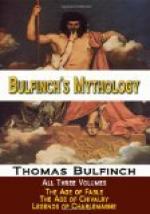Then they returned unto the land and rode forth. And Sir Arthur looked on the sword and liked it right well.
So they rode unto Caerleon, whereof his knights were passing glad. And when they heard of his adventures they marvelled that he would jeopard his person so alone. But all men of worship said it was a fine thing to be under such a chieftain as would put his person in adventure as other poor knights did.
CHAPTER VI
SIR GAWAIN
Sir Gawain was nephew to King Arthur, by his sister Morgana, married to Lot, king of Orkney, who was by Arthur made king of Norway. Sir Gawain was one of the most famous knights of the Round Table, and is characterized by the romancers as the sage and courteous Gawain. To this Chaucer alludes in his “Squiere’s Tale,” where the strange knight “salueth” all the court
“With so high reverence
and observance,
As well in speeche as in countenance,
That Gawain, with his olde
curtesie,
Though he were come agen out
of faerie,
Ne coude him not amenden with
a word.”
Gawain’s brothers were Agrivain, Gahariet, and Gareth.
SIR GAWAIN’S MARRIAGE
Once upon a time King Arthur held his court in merry Carlisle, when a damsel came before him and craved a boon. It was for vengeance upon a caitiff knight, who had made her lover captive and despoiled her of her lands. King Arthur commanded to bring him his sword, Excalibar, and to saddle his steed, and rode forth without delay to right the lady’s wrong. Ere long he reached the castle of the grim baron, and challenged him to the conflict. But the castle stood on magic ground, and the spell was such that no knight could tread thereon but straight his courage fell and his strength decayed. King Arthur felt the charm, and before a blow was struck, his sturdy limbs lost their strength, and his head grew faint. He was fain to yield himself prisoner to the churlish knight, who refused to release him except upon condition that he should return at the end of a year, and bring a true answer to the question, “What thing is it which women most desire?” or in default thereof surrender himself and his lands. King Arthur accepted the terms, and gave his oath to return at the time appointed. During the year the king rode east, and he rode west, and inquired of all whom he met what thing it is which all women most desire. Some told him riches; some, pomp and state; some, mirth; some, flattery; and some, a gallant knight. But in the diversity of answers he could find no sure dependence. The year was well-nigh spent, when one day, as he rode thoughtfully through a forest, he saw sitting beneath a tree a lady of such hideous aspect that he turned away his eyes, and when she greeted him in seemly sort, made no answer. “What wight art thou,” the lady said, “that will not speak to me?




